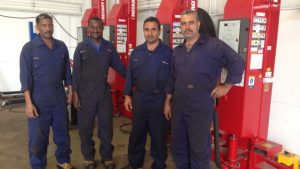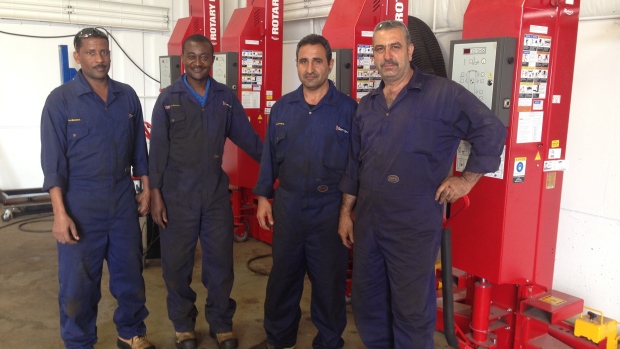By Moira Donovan, CBC News, 03 August 2016.

With over 20 years of experience as a mechanic in three countries, there isn’t much about working on cars that Mohamad Malli doesn’t know.
But since he arrived in Nova Scotia in January, the language barrier was one problem that Malli, who is originally from Syria and most recently lived in Jordan, couldn’t fix on his own.
Over the past month, Malli has been getting some assistance bridging that divide from an Immigrant Services Association of Nova Scotia program that helps him translate his skills as a mechanic to the Canadian context.
The Bridge to Work program connects newcomers who are trained in a trade with employers who need their skills, linking the two through on-site language classes and interpreters.
Adjusting to a new context
For Malli, this has meant an assessment placement at MacPhee Ford in Dartmouth, where he — along with three other mechanics, from Eritrea, Democratic Republic of Congo and Syria — will eventually undergo apprenticeships towards their red seal certifications.
There are differences, Malli said. He was accustomed to working on Japanese cars in Syria, and had never worked on American vehicles before starting at MacPhee. He’s also adjusting to different equipment, which he said reduces the strain on his body.
Learning what he’s been missing, he said, “is wonderful.”
Meeting a mutual need
MacPhee Ford general manager Andrew MacPhee said the program also helps the business.
“There is a legitimate shortage of technicians, so it’s filling a business need,” he told CBC’s Information Morning. “And these new Canadians are very excited to be participating.”
The assessment period allows MacPhee Ford to determine the appropriate apprenticeship level for Malli and the other participants.
“The goal is to have four well-trained journeyman technicians in a few years.”
Translating technical language
The pilot project is currently supporting six tradespeople in total at businesses around the Halifax Regional Municipality and aims to find placements for 15 participants.
The placements allow trainee technicians to learn practices, such as safety protocol, that are different from those they were familiar with in their home countries.
It also helps with the kinds of lessons that are hard to confine to a classroom. Technical language in particular can be hard to translate, said MacPhee, meaning that the names of car parts are best learned on the job.
“The only thing they’re working on now is car lingo,” he said.
“Because they’re partnered with a journeyman technician, they’re learning that stuff on the job every day.”
‘They know where they are going’
The program’s co-ordinator, Mai Al Nabhan, said that the opportunity to work in their field encourages participants to feel at home in Canada.
“They are all coming from war zones, so they are all coming with their own difficulties and challenges,” she said.
“However, starting work in their field is definitely the first step to having a permanent life in Canada. They consider themselves starting a new life and they know where they are going.”
Language is the first barrier that many newcomers experience, said Al Nabhan, and having a job is an important step in overcoming that barrier.
Elements of success
Now, she said, it’s up to employers to follow the lead of businesses like MacPhee Ford and remember that the benefits flow both ways.
“They are all tradespeople, they have huge experience, they have families and they have the urge to build a future, so we have all the elements for success,” she said.
“The only thing they need is support.”
[divider]
We would like to acknowledge and thank our Bridge to Work funders:
- Nova Scotia Office of Immigration (NSOI) funds the Bridge to Work Program
- Nova Scotia Apprenticeship Agency (NSAA) funds the 12 week on-the-job practical assessment
- Employment Nova Scotia funds the NSCC Customized Training Programs
- Immigration, Refugees & Citizenship Canada (IRCC) funds the language training for the Bridge to Work Program
